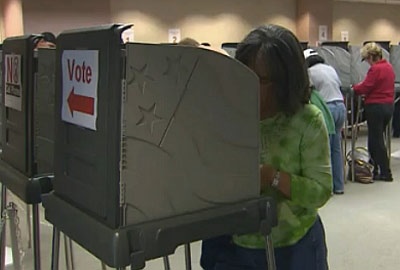VOICES: In North Carolina, a conspicuous partisan power play

By Chris Fitzsimon, NC Policy Watch
Republicans in North Carolina are determined to do everything they can to make it more difficult for you to vote, especially if you are a member of a demographic group likely to support their political opponents. It is one of their key priorities this legislative session, to change the state's voting laws to keep themselves in power.
That's simply a fact that Republicans can no longer deny and not just because of their insistence on passing a completely unnecessary and restrictive voter ID bill this session.
House Majority Leader Edgar Starnes has filed legislation that would shorten the length of time for early voting, prohibit voting on Sunday, abolish same-day registration at early voting sites, and end straight-ticket voting.
Republican leaders don't have anything close to a legitimate reason for the thinly-veiled attempt to manipulate the state's voting laws for their partisan advantage.
They used to claim that voter ID provisions were needed to solve the problem of widespread voter fraud. But House Speaker Thom Tillis all but admitted recently that fraud is not the reason for the voter ID bill, that it was instead about restoring the public's faith in the integrity of our elections.
In other words, we need a restrictive voter ID bill because people are worried about all the voter fraud that Republicans have been misleadingly claiming was happening in North Carolina.
They are trying to solve a problem they created so they can help themselves politically by solving it. They might be undermining democracy, but you have to give them credit for their brazenness.
The voter ID bill is understandably drawing the most attention with packed public hearings and testy panel discussions. And no can dispute that at a bare minimum tens of thousands of eligible voters in North Carolina do not have a government-issued photo ID, many of them seniors, people with disabilities, and people of color, all of whom are traditionally more likely to support Democratic candidates.
The changes Rep. Starnes wants to make are equally disturbing. Why would we want to shorten the length of time people have to vote or not allow people to cast their ballots on Sunday, unless we prefer fewer people show up at the polls?
When did that become a legitimate policy position, that we want fewer people to decide elections? The same question applies to Starnes' plan to abolish straight-ticket voting. Some people prefer to support all the candidates of one party. Why should we make it more difficult for them to do that?
The answer is simple. Republicans believe it will make it easier for them to win elections. They do not want everybody to vote, they want to put up barriers and restrictions to make it more likely that people who not care for their agenda will not cast a ballot.
You don't need a lot of studies and facts to figure this one out. If you have any doubts about the motivation here, another provision of Starnes' proposal ought to clear them up.
It would actually loosen the regulations for voting with absentee ballots, where experts agree voter fraud is already more likely. But absentee voters are traditionally more likely to vote for Republicans than Democrats.
It's pretty obvious what is going on here and it has nothing at all to do with integrity.
Tags
NC Policy Watch
A project of the N.C. Justice Center, N.C. Policy Watch is a news and commentary outlet dedicated to informing the public and elected officials as they debate important issues and to improving the quality of life for all North Carolinians.
